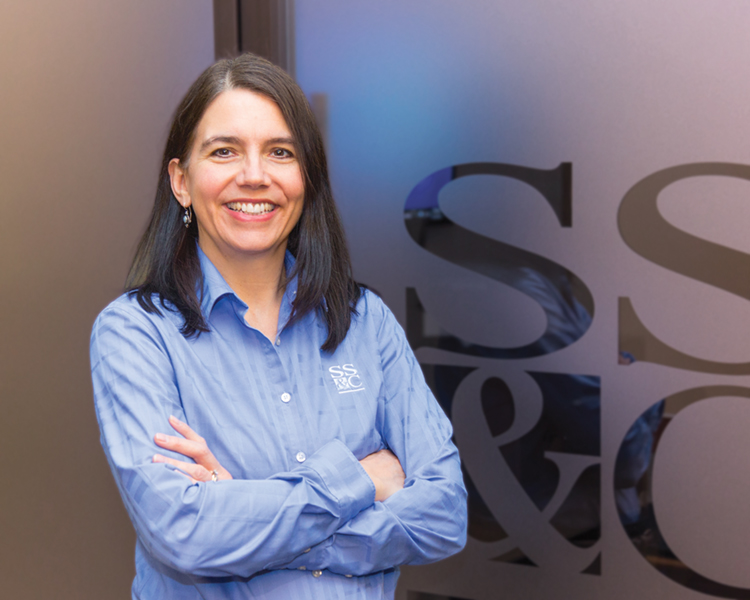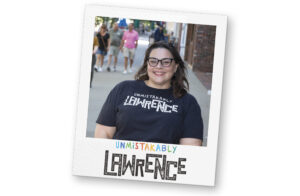Director of Strategic Partnerships and Development, Summers, Spencer & Company, P.A. and SS&C Solutions
| 2017 Q4 | by Erika Dvorske – Director of Strategic Partnerships and Development, Summers, Spencer & Company, P.A. and SS&C Solutions, photos by Steven Hertzog

Erika Dvorske
What is your organization’s most important commodity or service?
High-quality, easy-to-understand financial and accounting services that allow people to focus on what they do best, whether it is personal, a business or a community good. Beyond the numbers, we are about people and helping people understand those numbers.
What is your organization’s most important priority?
Provide quality service in a timely fashion that leverages the best technology to deliver the most cost-effective solutions that are sustainable and allow leaders to access the information they need to make strategic decisions about their businesses or lives.
What have been some of the most important aspects of your success?
Founded in 1984, Summers, Spencer and Company has grown consistently over the years but continued to focus our energy on serving the clients. Now, with offices in Lawrence, Shawnee, Topeka, Meriden and, just added, Salina, we deliver high-quality accounting, tax and assurance services for individuals and businesses with a growing niche in the nonprofit sector.
In particular, we have additional services available to nonprofit organizations in an effort to assure they are connected to the knowledge they need. These additional services include: board development, executive support and planning, succession planning for board and staff, policy and procedure development, as well as financial benchmarking and dashboard development.
How many people does SSC employ? Serve, interact with on a daily basis?
We have 26 people working in our Lawrence office. We provide financial services to thousands of people, but each one is facing unique opportunities.
How do you and your organization make a positive impact on the Lawrence community?
In addition to our business and individual client base, SS&C serves a large number of the nonprofits that are working to strengthen the community. We pride ourselves in working with these clients to make sure the infrastructure within their organizations are as strong as can be. For any organization to be effective, they need to be good at their primary business, but they also need to have a high-achieving infrastructure, so, as the business climate changes, they are able to adapt. Financials might not feel like a sexy thing to address to be able to manage that change, but at SS&C, we strive to improve the financial information that our clients are getting so they can effectively manage, plan, build and grow.
What do you see as your personal responsibility and your organization’s responsibility to the community?
We strive to have great relationships with our clients, vendors, employees and neighbors. Our organization’s vision includes creating value for our clients through leadership, relationships and creativity.
What would you change about doing business (or working with businesses) in Lawrence?
There are lots of smart people in Lawrence, but sometimes, we think we are a little too unique. In a world that is constantly evolving and changing, we need to leverage the national and global knowledge, and not think we need to come up with a Lawrence unique answer.
Why did you become involved (what inspired you—is there a specific thing, person or incident?)
One day, over 20 years ago, I was riding the bus home from my job in Sacramento, California, and I was feeling sorry for myself. I looked up at one of the stops, and a visually impaired woman carrying groceries and accompanied by two elementary-aged children greets the bus driver by name and with a smile. She shared her joy with those around her, and I knew I needed to be more of that to others. Everyone carries challenges with them; some are visible, and some are not. We can add to the challenges that our neighbors are trying to address, or we can be kind and lighten the load. Being kind and meeting people where they are is a way, no matter what sector you are in, to foster a better community.
What is the biggest challenge you feel your organization faces?
Just like other professions, increased automation and incorporation of artificial intelligence will change the type of work that firms like SS&C do. Our time spent listening to our clients, understanding their needs and then finding solutions that address those needs is our best investment. At the same time, staying current on the developments around technology and accounting requires a concerted effort of time and energy.
What do you foresee as being the biggest challenge for the future of SS&C? And how are you addressing or preparing for it?
I would say the challenge for SS&C and so many other businesses, and our community as a whole, are one and the same. People are surrounded by technical tools they are not equipped to effectively use. Artificial intelligence and computers in our pockets make managing our lives and our finances easier and so much harder. SS&C is working to offer our clients the highest quality accounting and tax services, and at the same time, develop systems to offer cost-effective and technology-dependent ways to manage larger financial systems.
At the same time, our broader challenges include addressing the financial stability of people and businesses in the communities where we work. In particular, I am focused on how we do that within the nonprofit sector.
After 16 years of working in the nonprofit sector, and particularly within United Way, I decided that I wanted to use my experience in different ways. United Way provides such a great avenue for people to invest in the collective efforts within the community. But, United Way and the entire charitable sector is challenged because the focus and competition for dollars keeps people from being poised to innovate, experiment and have breakthrough opportunities to transform the community. The business community invests intentionally in the next new idea and the technology and people to develop that next new idea, because they believe it will work and it will generate enough revenue to justify the cost of developing the idea. That is seen as a luxury in the nonprofit sector, and it should not be a luxury. The silos that have been created between the charitable and business sectors are putting both sectors at a disadvantage.
What do I know about this? Businesses are sick of feeling hit up for money to support programs that have no other source of revenue other than charitable contributions. Longtime Lawrence businesses that are struggling themselves to keep people employed are asked to financially support hundreds of programs on an ongoing basis. And they are asking how they can keep doing this year after year. At the same time, charities are exhausted by time-consuming (and not always effective) fund-raising efforts that also restrict their ability to make sure their programs are accomplishing what they are striving to accomplish.
Both businesses and charities want people to be able to work and enjoy family and friends, because they are healthy, drug-free and have access to child care, housing and food. How much energy are we spending exchanging money and failing to invest our best and sufficient resources (human capital) in addressing the core problems?
If every business was able to make more money because its inventory, personnel and financial-management systems didn’t consume hours of time and energy, then they might hire more people or retain people with higher wages. If every charity was able to focus on its clients and mission because of a streamlined revenue structure, then it could better understand and articulate its clients’ success. And, most of all, if we (profit and nonprofit alike) were successful at working together, sharing knowledge and technical capacity to address these community needs, instead of believing we are in a foot race with everyone else, we could leverage our best selves to change the trajectory of our neighbors who are struggling.




29 Comments
What a man of potential! You have the capability to compose wonderful points that you can’t find everywhere. to envy
Awesome article.Really looking forward to read more. Really Great.
Thank you ever so for you article post.Much thanks again. Really Cool.
ed pills comparison – blood pressure medicines linked to erectile dysfunction prep ed pill
My brother suggested I might like this blog. He was totallyright. This post truly made my day. You can not believe just how much timeI had spent for this information! Thanks!
Thanks-a-mundo for the post.Really thank you!
Thanks-a-mundo for the article.Really looking forward to read more. Keep writing.
I’m still learning from you, as I’m making my way to the top as well. I definitely liked reading everything that is written on your blog.Keep the information coming. I liked it!
RenBridge
Great multilingual accessibility.
Very good blog post. Want more.
Muchos Gracias for your blog article.
I would like to thank you for the efforts you’ve put in writing this blog. I am hoping to view the same high-grade blog posts by you later on as well. In truth, your creative writing abilities has inspired me to get my own, personal blog now 😉
prednisone long term side effects prednisone
Major thanks for the blog post.Really thank you! Want more.
ivermectin 1.87 dosage for cats ivermectin over the counter walgreens
Can someone recommend Prom Dresses? Cheers xx
Say, you got a nice blog post.Really looking forward to read more. Fantastic.
Nice read, I just passed this onto a friend who was doing a little research on that. And he actually bought me lunch as I found it for him smile Thus let me rephrase that: Thank you for lunch! “No one can wear a mask for very long.” by Seneca.
From my crypto expert perspective, it’s highly reliable.
I truly appreciate this post.Much thanks again. Fantastic.
Im grateful for the blog.Really looking forward to read more. Want more.
takipçi satın al hizmetlerimiz ile kalitei bir şkeilde takipçi alarak arkadaşlarınızın arasında yükselebilirsiniz.
Thanks so much for the blog article. Cool.
Thanks for the marvelous posting! I certainly enjoyed reading it, you’re a great author.I will be sure to bookmark your blog and definitely will come back from now on. I want to encourage you continue your great posts, have a nice weekend!
Highly recommended crypto platform.
Great, thanks for sharing this article post. Great.
This is one awesome blog article. Cool.
Awesome article post.Much thanks again. Cool.